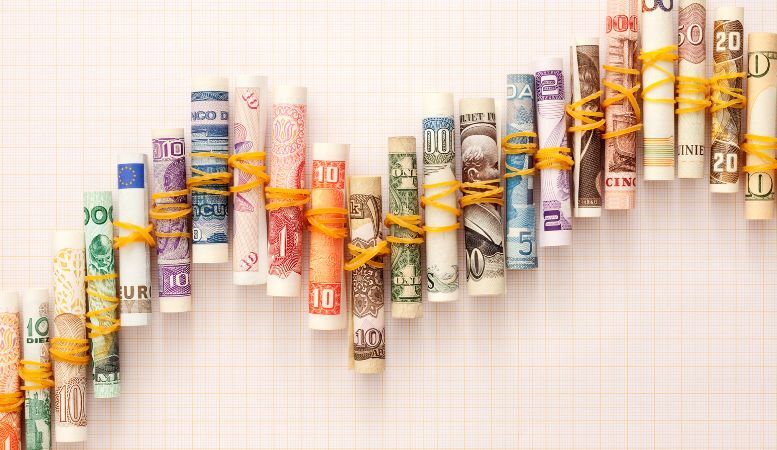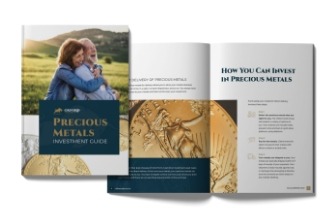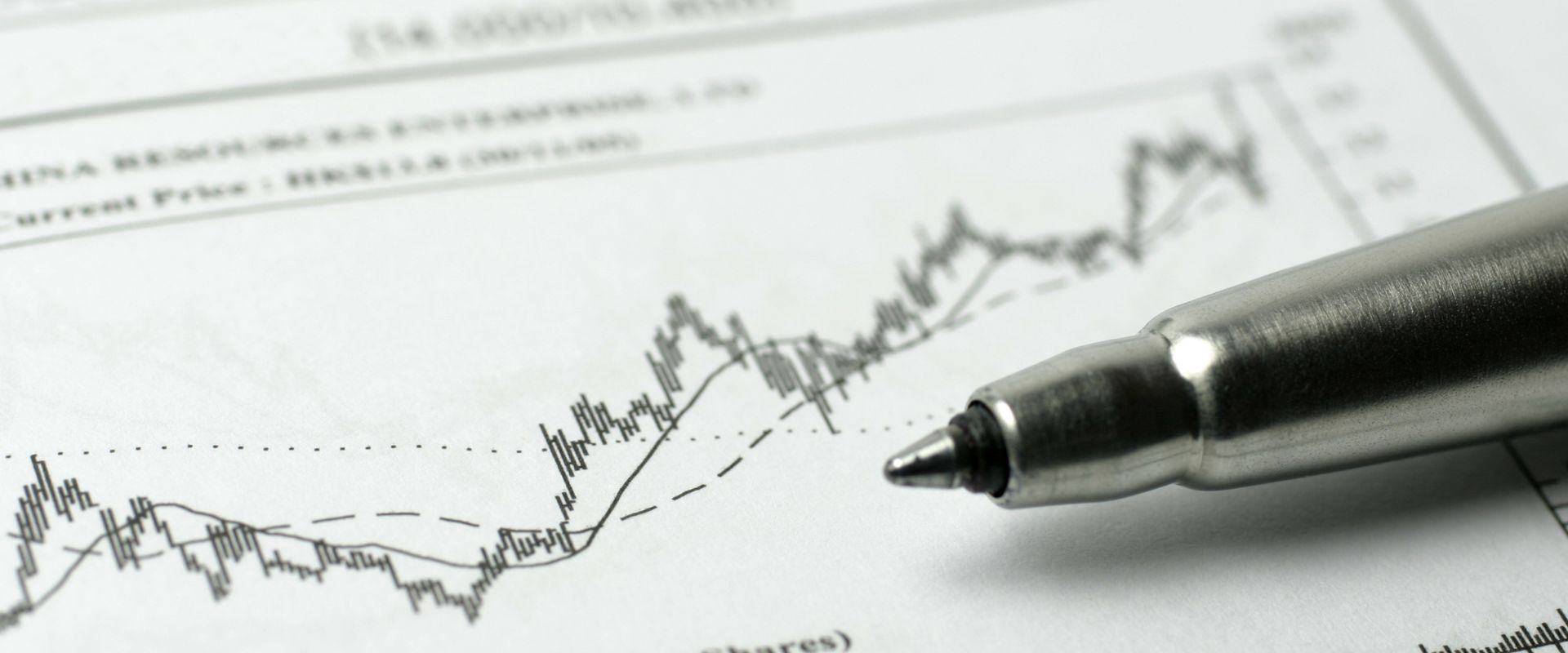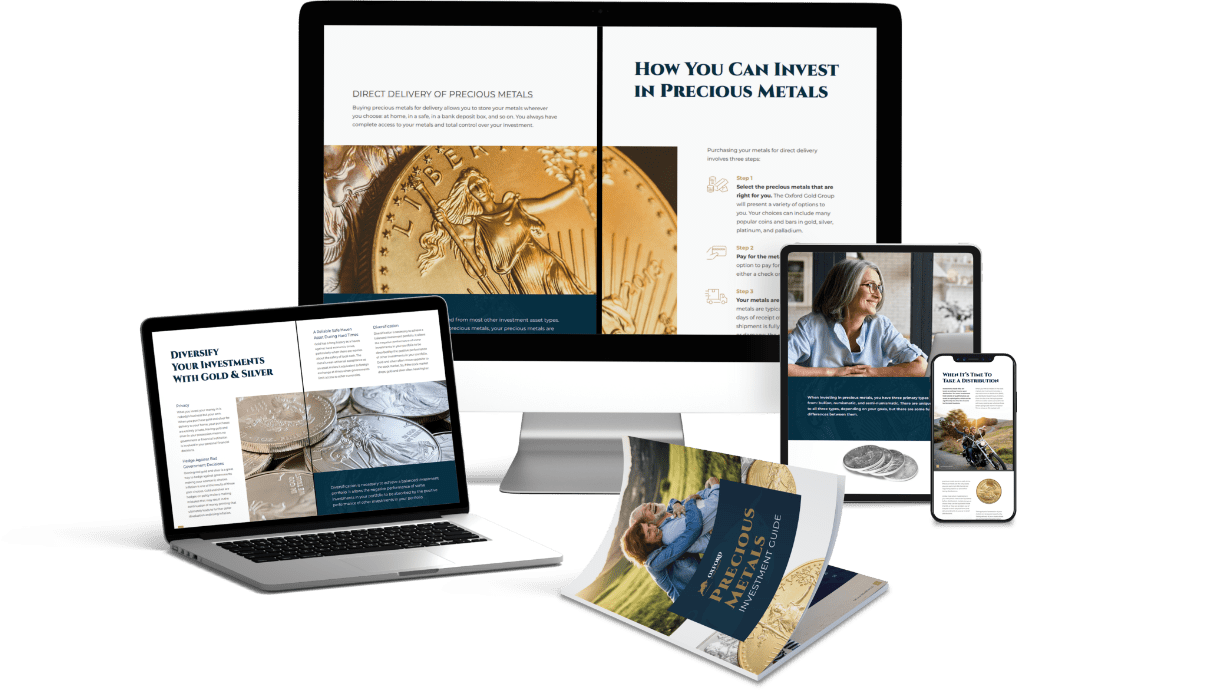Table of Contents
Gold is a highly desirable, tradeable commodity that many cultures have historically used as a primary currency. Although the developed world has moved to fiat currencies, gold continues to hold value and impact global markets.
How much does gold affect the economy? The answer goes both ways: Gold plays a key role in various industries, while overall economic tendencies and inflation impact gold prices. Let’s dive deeper into gold’s role in economic dynamics.
How Does Gold Affect the Economy?
There’s a direct, two-way relationship between the gold market and economic trends. Although times change and other assets gain the spotlight, it’s impossible to dismiss gold’s significance in economic performance.
Store of Value
Thanks to its stability, gold acts as a reliable store of value. Gold retains its worth and appreciates over time despite the occasional ups and downs. If you buy gold today, chances are you’ll gain when you sell your investment 20 or 30 years from now.
Wealth Preservation
When inflation hits, classic investments like stocks and bonds lose some value. Converting part of your assets into gold can help you preserve wealth.
It’s no coincidence that people tend to buy gold when interest rates fall. In hard times, when stocks yield less profit, gold becomes a more appealing option for investors because of its tendency to appreciate, historical legacy, and global appeal.
Influence on Exchange Rates
If a country has considerable gold reserves or exports gold, its currency typically strengthens when gold prices rise. Meanwhile, countries that rely on gold imports for their industries will see a weaker national currency once gold prices climb as they redistribute capital to cushion the blow.
Like other commodities, gold prices follow the principles of supply and demand. Investors tend to buy more gold when the U.S. dollar falls, which bumps prices and increases the economic influence of gold. The demand for gold may weaken when the economy thrives, but this shiny yellow metal always preserves its intrinsic value.
Historical Role of Gold in Maintaining Currency Stability

For many centuries, gold served as the backbone of national currencies. Gold maintained its key status as the global reserve currency until the latter half of the 20th century. The United States continued using the gold standard until Nixon’s administration abolished it in 1971.
The gold standard used to place restrictions on printing fiat currencies. Because gold had to back paper money, banks could only print as much money as the value of gold they held in their reserves. Removing the gold standard gave more freedom to central banks but also took away the stability of fiat currencies.
Although countries no longer use the gold standard, investors continue to buy gold as a hedge against inflation and economic downturns. Some economists argue that the world should adopt the gold standard again to offset economic volatility.
What Impact Do Gold Reserves Have on a Central Bank’s Monetary Policies?
Central banks control nations’ money supply. The market operations of central banks, like purchasing and selling securities, influence interest rates.
Central banks also purchase gold bullion. When you ask, “How much does gold affect the economy?” you should know that central banks hold a significant portion of all the world’s gold. Like individual investors, banks buy gold to diversify reserves and protect themselves against the instability of fiat currencies by buying a universally recognized asset with immutable value. Banks holding more gold will enjoy a stronger position in an economic collapse.
The policies of central banks in purchasing gold can influence the national currency. If banks print more currency to buy gold, this can create too much fiat money and induce inflation.
How Does Gold Contribute to Economic Growth Through Technology?
To understand the effects of gold prices on financial health, remember that gold is more than a tradeable asset; it’s also a key player in various industries. Gold is an extremely useful metal in many applications, from tech gadgets to medical devices.
Precious metals like gold offer two major advantages: excellent conductivity and high corrosion resistance. This makes gold indispensable for applications like automotive RF connectors. Laptops, cell phones, GPS units, and other electronic devices all feature gold components.
Other industries that use gold include dentistry, aerospace, and glass production. Gold’s stability and low reactivity make it indispensable for solar cells, lithium-ion batteries, nanotechnology, and other advanced uses. In the future, we’ll likely see an even higher demand for gold in technological applications.
Although recovering gold from old, discarded devices is possible, it’s a labor-intensive process. Manufacturers are exploring industrial alternatives to gold, like silver and palladium, but these may not work for all applications. The price of gold may rise in response to industrial demand.
What Is the Economic Significance of Gold Demand in the Jewelry Industry?

The impact of gold prices on the economy plays out most powerfully in the jewelry industry, which represents the biggest chunk of global demand for gold.
Despite various cheaper alternatives, like gold-plated and gold-filled jewelry, solid gold is irreplaceable for engagement and wedding rings, heirloom items, and any jewelry piece meant to stand the test of time. People who want to buy a ring, bracelet, or necklace that they’ll wear for many years will typically choose solid gold.
With higher demand for gold and rising gold prices, jewelry retailers encounter steeper overhead costs, which eventually pass on to customers. However, unlike smartphones or medical devices, jewelry items are optional purchases. Since buying jewelry is about wants, not needs, people will buy less during hard times.
To keep the profits rolling in, jewelers develop various creative solutions, like thinner designs that use less gold or lower-purity alloys. The most popular choice for fine jewelry has been 14-karat gold (58.3% gold and 41.7% alloy), but now, more jewelers use the cheaper 10-karat gold (41.7% gold and 58.3% alloy), even for engagement and wedding rings.
How Does Gold Mining Contribute to Economic Activity?
So, how much does gold affect the economy? In countries with significant natural gold reserves, gold mining can create economic opportunities, improve employment options, and enhance infrastructure. With responsible and eco-conscious practices, gold mining can contribute to financial and social development, especially in poorer, more remote regions.
South Africa, one of the world’s most important gold sources, has over 130 years of gold mining history. The country’s leading position in gold production boosted its economic growth and industrialization. However, gold mining also raises social and environmental concerns. Without proper control, mining can create toxic waste that pollutes water sources, destroys habitats, and displaces whole communities. Some gold mining companies exploit their employees. That’s why the gold mining industry needs extensive regulation to ensure ethical mining and protect workers.
Consider Physical Gold as a Safe Hedge Investment
In uncertain times, people ask not only, “How much does gold affect the economy?” but also, “Can holding physical gold help protect my wealth?”
Gold is a stable asset that has kept its value throughout human history. Purchasing gold bullion can give you security when fiat currencies depreciate and the future looks bleak.
At Oxford Gold Group, we offer high-purity precious metals at competitive prices. Check out our selection of gold coins and bars or contact us to learn more about investing in precious metals to secure your retirement and financial future.








